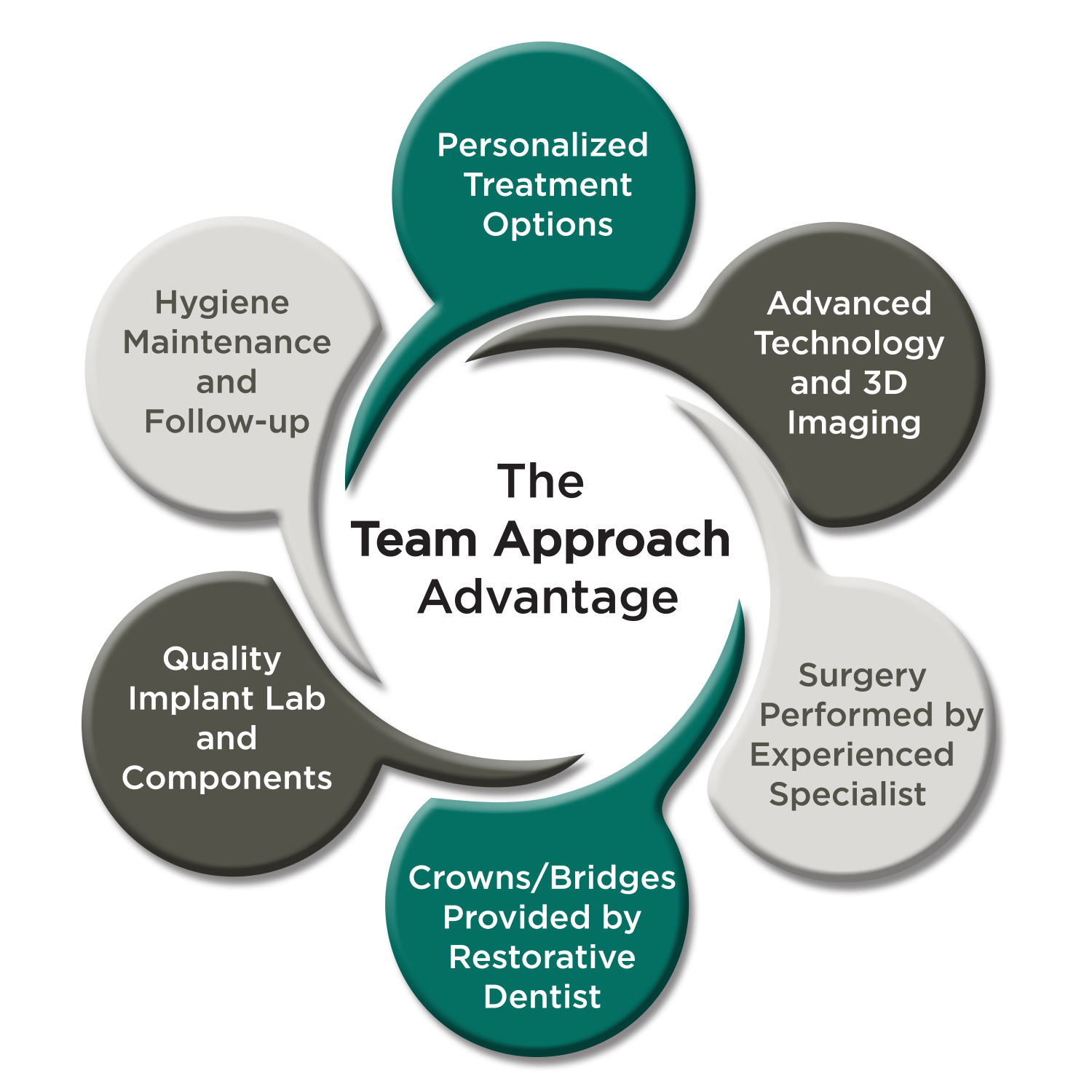Traditionally, implant treatment has been provided by a team that included a surgical specialist and a prosthodontist (specialist in tooth restoration and replacement) or an experienced general dentist. Recently, the choice of where to go for implant treatment has become confusing due to questionable advertising claims. Implant centers are opening throughout the country, advertising that they are the “experts” and “leaders” in dental implant treatment, as well as a more convenient and affordable option for patients. There are also numerous general dentists advertising that they provide both the surgical and restorative aspects of dental implant treatment. To determine the best option for your dental implant treatment, it is important to understand the benefits of the team approach compared to other options.
The Private Practice Team Approach
Oral Surgeons and Periodontists are ADA-recognized surgical specialists. They completed post-graduate surgical residency programs and have had years of training and experience in not only surgical procedures, but also the management of potential complications. This should be one of the most important considerations for any patient contemplating a surgical procedure.
Prosthodontists are ADA-recognized specialists in the restoration and replacement of teeth. They receive extensive training and experience during their post-graduate residency programs. For complex cases, such as complete tooth replacement, the additional training and experience of a specialist is usually indicated.

An experienced Prosthodontist, or general dentist, working together with an experienced surgical specialist as a team, can offer many advantages to their patients. One important advantage is that the patients have the benefit of both areas of expertise, collaborating to develop the ideal treatment plan and provide optimal results. If the doctors have worked together for several years, their experience as a team is invaluable.
In this team approach, the Prosthodontist, or experienced general dentist, provides comprehensive treatment planning to ensure that the recommended implant treatment fits into the overall treatment plan for each patient. This is important for long-term dental health. The Prosthodontist, or general dentist, is also in a position to determine the ideal team of specialists that is best qualified to provide a personalized treatment plan that meets the unique esthetic and functional needs of each individual patient. Another consideration is continuing care to ensure optimal oral health long-term.
The Single Dentist Provider
The dentists who provide both the surgical and restorative implant procedures are generally referred to as implantologists. Some of these dentists have had extensive training in various implant treatment modalities. Although there are several skilled implantologists, one individual dentist will never achieve the level of expertise in all specialties necessary to provide ideal comprehensive treatment. Therefore, many general dentists who place dental implants will refer any complex or difficult cases to surgical specialists.
Unfortunately, there are numerous general dentists who surgically place implants after having taken an abbreviated basic surgical training course (1-3 days). These dentists, who are providing surgical procedures for patients without having adequate training on surgical procedures and the management of potential complications, should be avoided. Some implantologists advertise that they have specialized credentials in implantology. It is important to understand that the American Dental Association does not recognize implantology as a specialty. Implant dentistry is an interdisciplinary field in dentistry, with both surgical and restorative aspects incorporated.
The following questions can help you determine whether a non-specialist is experienced with dental implant placement.
How many surgical training courses has the dentist taken and how long was each course?
Did these courses comply with the recommended guidelines for meeting the legal standard of care for surgical implant placement?
How many courses has the dentist taken specifically on the management of complications?
How many continuing education courses on implants does the dentist attend on a yearly basis?
How long has the dentist been placing implants and how many implants does the dentist place each year?
Does the dentist refer complex or difficult cases to a surgical specialist?
How many bone grafting procedures has the dentist has done?